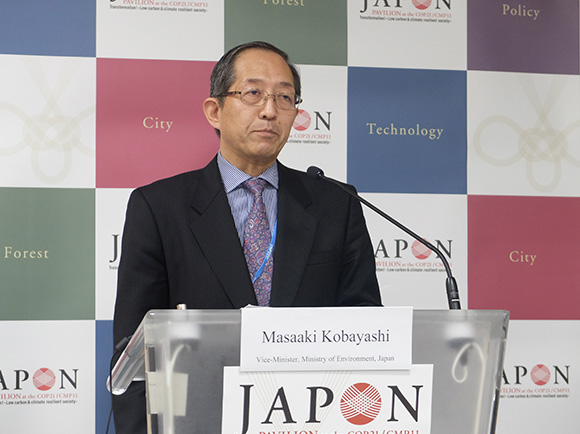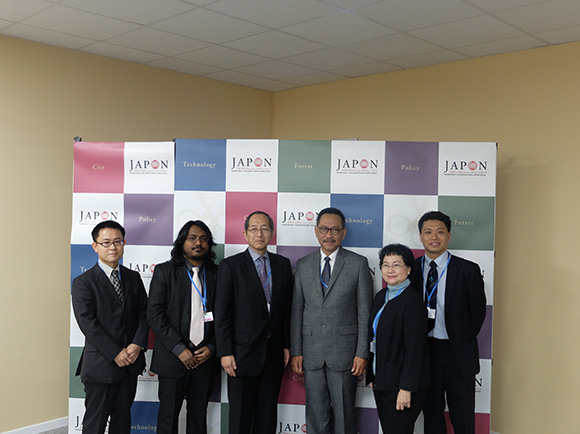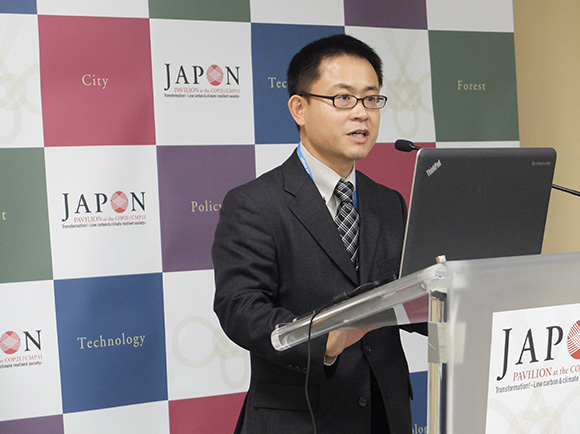Promoting Investment in Innovative Low-Carbon Technology: ADB and the Government of Japan Present the Experience of the Japan Fund for Joint Crediting Mechanism
Ministry of the Environment, Japan; Asian Development Bank (ADB)
Outline
With the support and collaboration of the Government of Japan, ADB has been able to promote a range of mitigation and adaptation activities in developing countries in the Asia and the Pacific. In 2014, the Ministry of the Environment, Japan (MOEJ) and ADB established the Japan Fund for the Joint Crediting Mechanism (JFJCM) which supports the adoption of advanced low carbon technology in ADB projects.
This session will provide an overview of the Joint Crediting Mechanism (JCM) and the JFJCM. Two JFJCM-supported projects in Maldives and Mongolia will be presented as examples for the promotion of innovative low carbon technology through this mechanism. MOEJ, ADB, and country representatives will discuss experiences and expectations from the JCM.
Program
-
- Welcome remarks
- Masaaki Kobayashi, Vice-Minister for Global Environment, Ministry of Environment, Japan
-
- Opening remarks
- Bambang Susantono, Vice President of Knowledge and Management and Sustainable Development, Asian Development Bank
-
- Photo session
-
- Current Status of JCM
- Nobuhiro Kino, Director, International Cooperation Office, Ministry of Environment, Japan
-
- Japan Fund for the Joint Crediting Mechanism (JFJCM) and low carbon technology
- Ryuzo Sugimoto, Fund Manager of JFJCM, Asian Development Bank
-
- Current Status of JCM in Maldives and JFJCM project
- Zammath Khaleel, Environment Analyst, Ministry of Environment and Energy, Maldives
-
- Current Status of JCM in Mongolia and JFJCM project
- Ryuzo Sugimoto, ADB
-
- Current Status of the JCM Activities in Thailand
- Mrs. Prasertsuk Chamornmarn, Executive Director of Thailand Greenhouse Gas Management Organization
-
- Discussion of Expectations and Q&A
- Discussion how to promote the JCM project and accelerate transferring low carbon technology
Summary
- Mr. Masaaki Kobayashi, Vice-Minister for Global Environment, Ministry of Environment, Japan and Dr. Bambang Susantono, Vice President of Knowledge and Management and Sustainable Development, Asian Development Bank addressed the opening remarks highlighting the importance of technology transfer for climate mitigation together with financial support as undertaken JCM.
- Mr. Nobuhiro Kino, Director, International Cooperation Office, Ministry of Environment, Japan updates the JCM progress including signing countries and registered projects, and status of financed projects and feasibility study. Latest signing countries is Thailand and it is announced that the Philippines government and Japanese Government has signed Aide Memoire to proceed concur on the Memorandum of Cooperation of JCM at the COP21.
- Mr. Ryuzo Sugimoto, Fund Manager of JFJCM, Asian Development Bank provided Japan Fund for the Joint Crediting Mechanism (JFJCM) and low carbon technology. Two financed project in Maldives and Mongolia and their used technology are explained. Potential projects in Viet Nam, Indonesia, Cambodia, Lao PDR, and Thailand are also expressed.
- Mr. Zammath Khaleel, Environment Analyst, Ministry of Environment and Energy, Maldives presented status of JCM in Maldives and JFJCM project. He emphasized high cost of electricity by diesel and importance of solar power in terms of economic and financial benefit in Maldives.
- Mr. Sugimoto, ADB explained the distribution project for Combined Heat and Power plant in Mongolia. The presentation highlighted the economic benefit of the amorphous transformer on the project as well as CO2 emission reduction.
- Mrs. Prasertsuk Chamornmarn, Executive Director of Thailand Greenhouse Gas Management Organization showed the implementation structure and current Status of the JCM Activities including financed project in Thailand. She also expressed the expectation of the contribution of JCM and JFJCM to Thailand’s INDC.
- The questionnaire was how fast the countries can sign with Japanese government and the role of the university in the JCM. It takes 1 - 3 years for consultation for each country in the past but it will be expected that output of the JCM implementation show JCM’s effectiveness and accelerate the consultation. Although JCM does not provide finance to academic research, however, the school has opportunity to adopt innovative technology as showcase and enhance the understanding of the students regarding the climate change issue.
Key Messages
- Joint Crediting Mechanism is the one of new market mechanisms implemented without waiting for international negotiations. Developing countries appreciates this speed.
- Adoption of low carbon technology has economic and social benefit and the key is how fast to disseminate such technology.
- Both public and private finance to climate change are important. JCM can catalyze both finances to low carbon project by co-financing a part of the technology cost.
Photograph
Reporters
Mr. Tomoki Uematsu, Resercher, International Cooperation Office, International Strategy Division, Global Environment Bureau, Ministry of the Environment










